Redditor Decides Never To Speak To Parents Again After They Put Down The Cat Without Asking Them
Nobody knows your cat as you and your family do. So, even though it’s challenging, try to decide what’s best for your cat.
When we are about to lose a pet, we frequently feel guilty about euthanizing them too soon or too late. But these are common grief reactions, and you’re not the only one who experiences them.
It can be emotionally and financially taxing to have an aging or terminally ill cat, and caring for them often requires a significant investment of time. Even for your veterinarian, it can be challenging to evaluate your cat’s chronic pain.
The OP’s cat in today’s story had a large mass on his kidney, and the vet suspected that it was stage 3-4 cancer. The thing is, the OP had the parents take the cat to the vet because the OP thought the cat had a cold.
I know you might be asking why the OP didn’t take the cat instead. Well, the OP has "two herniated disks and can’t carry the carrier and open the multiple doors and hold the carrier without fear of dropping it."
When the OP’s parents found out about the situation with the cat, they decided to put him down instead of letting the OP know first. This action got the OP so mad that they chose not to speak to the parents again.
OP asks:

And the story begins...
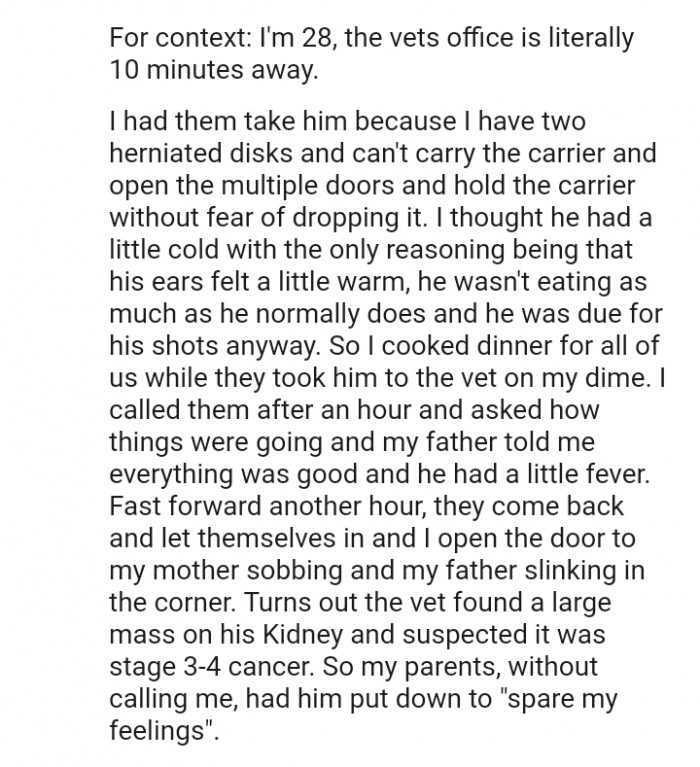
They stole an opportunity for any closure I could have
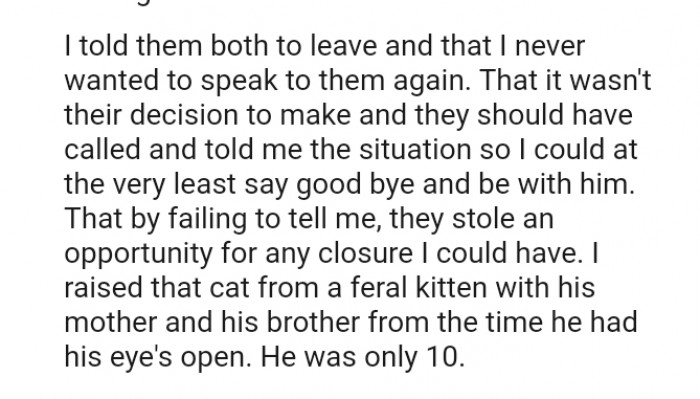
The Emotional Impact of Pet Loss
Research indicates that the loss of a pet can evoke profound grief, often comparable to the loss of a human loved one. According to Dr. Ramani Durvasula, a clinical psychologist, "The bond we share with our pets is unique and can lead to intense feelings of sadness, anger, and guilt when they pass." This emotional turmoil is compounded by the unique bond that develops between humans and pets, which is often characterized by unconditional love and companionship. Dr. Durvasula emphasizes that "grief over a pet can be dismissed by others, leading to feelings of isolation and anger, particularly when family members fail to acknowledge the emotional significance of the loss." For more insights, visit her professional website at drramani.com.
Understanding Grief and Loss in Pet Ownership
The loss of a pet can evoke profound grief, reflecting the deep emotional bonds formed during their lifetime.
Research from the American Journal of Veterinary Research indicates that pet owners often experience grief similar to that of losing a close family member.
This profound sense of loss can be exacerbated when decisions around euthanasia or relinquishment are made without prior discussion, leading to feelings of betrayal and unresolved grief.
They proceeded to berate and belittle me

Here are a bunch of comments from Redditors in response to the post.
The story sounds like a bad sitcom episode

They robbed you of saying goodbye

The Role of Communication in Family Dynamics
Effective communication is a cornerstone of healthy family relationships. Dr. Susan David, an emotional agility expert, emphasizes that "the ability to communicate openly about difficult topics is essential for maintaining strong family bonds." When family members fail to discuss significant decisions, such as the euthanasia of a pet, it can lead to feelings of betrayal and unresolved grief. According to Dr. John Gottman, a renowned marriage researcher, "couples who engage in transparent discussions about sensitive issues often report higher levels of mutual understanding and emotional connectivity." In the case of the Redditor who felt wronged by their parents, establishing a more open line of communication could potentially help in processing the grief and resentment they now feel. For more insights, visit Dr. Susan David's website and Dr. John Gottman's website.
When a pet is suddenly removed from a household, it can leave emotional scars that impact relationships significantly.
According to Dr. Julie Axelrod, a clinical psychologist specializing in pet loss, unresolved grief can manifest in anger and resentment towards those perceived as responsible for the loss.
Addressing these feelings through open dialogue is essential for healing and moving forward.
This was no doubt the worst day of my life

This Redditor hopes the OP reconciles with them and move on

This Redditor would never speak to the family again if they did that

According to the American Psychological Association, unresolved grief can lead to complicated grief reactions, where an individual struggles to accept the loss and moves into prolonged states of mourning. This can be particularly relevant in cases where closure is denied, as seen in the Redditor's situation. The absence of a farewell might hinder the grieving process, making it difficult for them to move on.
To navigate this, grief counseling can be beneficial. Therapy approaches such as Cognitive Behavioral Therapy (CBT) can help individuals understand their feelings and develop coping strategies, while also addressing any underlying issues related to family dynamics.
The Importance of Communication in Grieving
Effective communication during times of grief is crucial for maintaining relationships and fostering understanding.
Research suggests that couples who engage in open discussions about their feelings surrounding loss report higher satisfaction in their relationships.
By sharing their emotions and experiences, partners can create a supportive environment that promotes healing.
This Redditor loves cats with all of their life
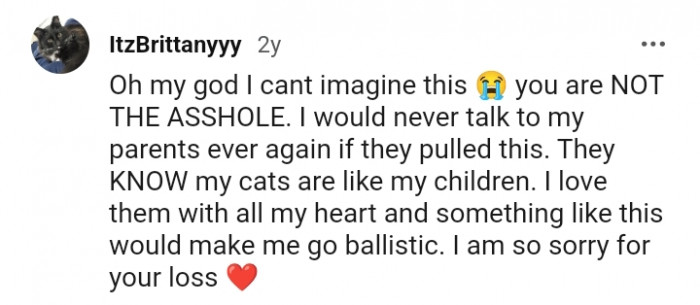
I can't imagine the frustration you must have

She withholds info to spare my feelings
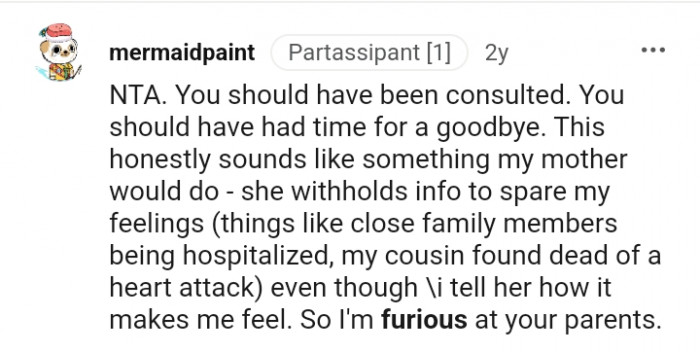
Understanding Guilt in Grief
Guilt is a common reaction in the grieving process, particularly when individuals feel they could have done something differently. A study in the Journal of Death and Dying found that feelings of guilt often stem from beliefs that one could have had an impact on the outcome of a loved one’s death. In this case, the Redditor's guilt about not being involved in the decision about their cat may amplify their emotional pain.
Therapists often encourage individuals to reframe their thoughts around guilt, understanding that feelings of helplessness in such situations are normal. Developing self-compassion and recognizing the limitations of one’s control can be pivotal steps in mitigating these feelings of guilt.
Establishing rituals for remembrance can help individuals process their grief and honor the memory of their pet.
Studies indicate that engaging in meaningful activities, such as creating a memory box or holding a memorial, can facilitate the grieving process.
These rituals provide opportunities for closure and can strengthen the bond between grieving individuals.
Let it be the straw that broke the camel's back
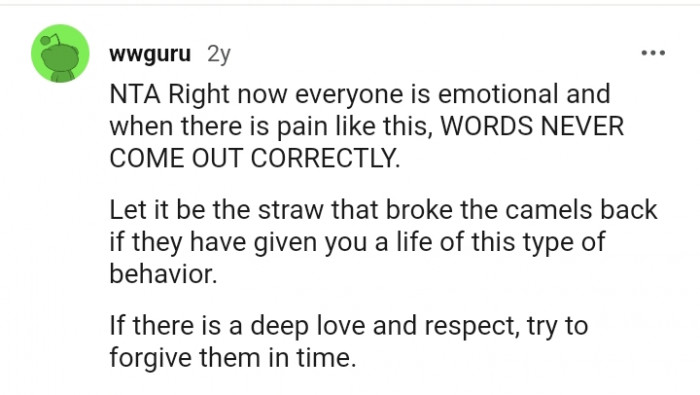
Try and see it from their own point of view

Then he would have suffered unnecessarily
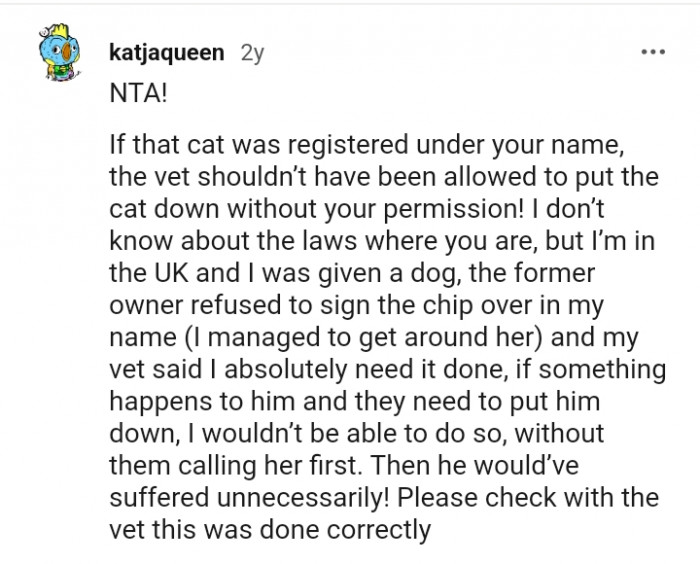
Family Conflict and Emotional Processing
Family dynamics can often complicate emotional processing, particularly during times of crisis. Research from the University of California, Berkeley indicates that unresolved family conflicts can hinder emotional expression, leading to a cycle of avoidance rather than open communication. In the Redditor's case, their decision to cut off contact with their parents may be a way to express their hurt, but it also risks perpetuating a cycle of isolation.
Therapists suggest that family mediation or therapy can help address these conflicts. Facilitated discussions might allow family members to express their perspectives and grievances, fostering a healthier environment for emotional healing.
Seeking Professional Help for Grief
When grief becomes overwhelming, seeking professional help can provide essential support.
Therapists trained in grief counseling can help individuals navigate their emotions and develop coping strategies.
Research shows that couples who engage in therapy during times of loss often emerge stronger and more connected than before.
They made a decision that wasn't there's to make
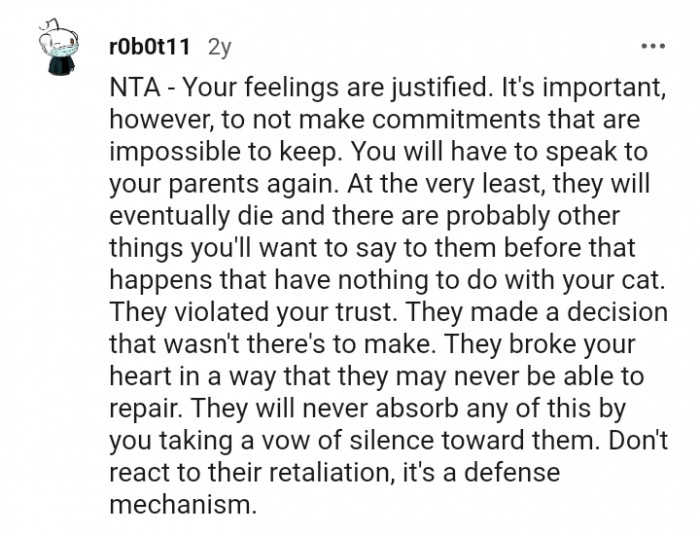
This Redditor put the cat down due to the pain he was in
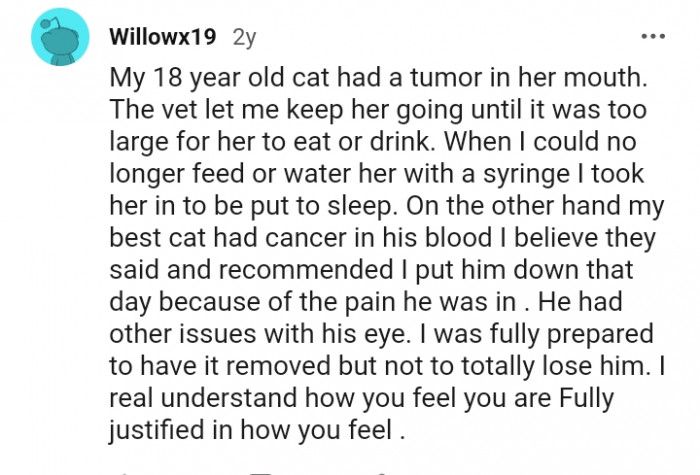
Saying good-bye is so important for grief processing
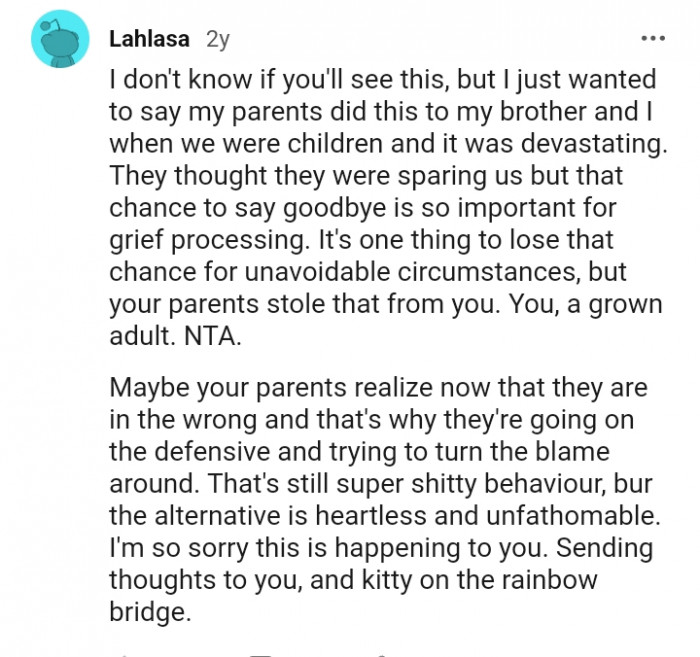
According to Dr. John Bowlby’s attachment theory, early relationships significantly shape our emotional responses in later life. When the Redditor expresses feelings of betrayal from their parents’ decision, it may reflect deeper issues regarding trust and attachment within their family system. If familial bonds feel unstable, it can lead to an increase in anxiety and conflict.
Understanding one's attachment style can be a useful first step in addressing these issues. Seeking therapy to explore these dynamics can help individuals develop healthier relationships, both with their families and themselves.
Creating a shared plan for grieving, including designated times for discussing feelings and honoring the pet's memory, can strengthen relationships.
Such planning can help both partners feel validated in their grief while providing a structured way to support each other.
Ultimately, this collaborative approach fosters resilience in the face of loss.
It took me a long time to speak to them again
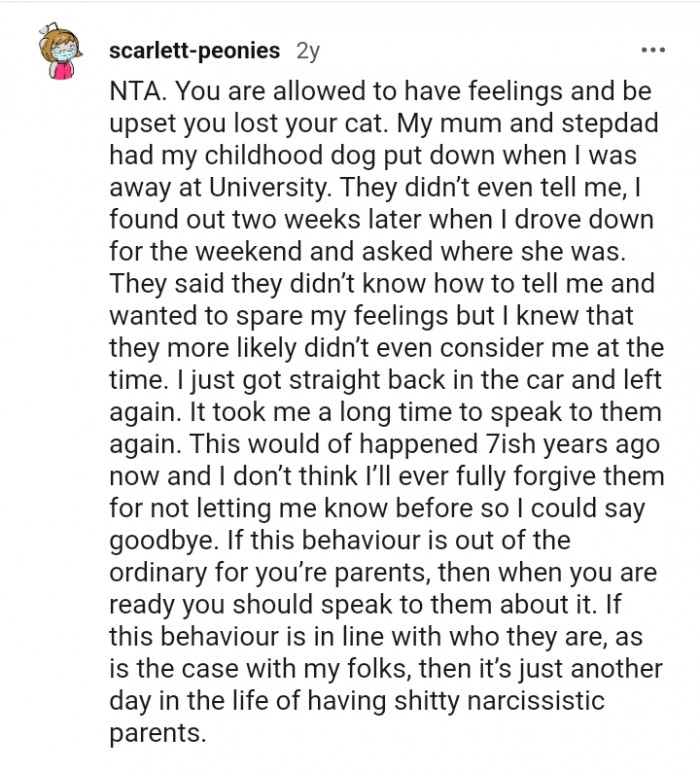
It is possible your parents could have done better
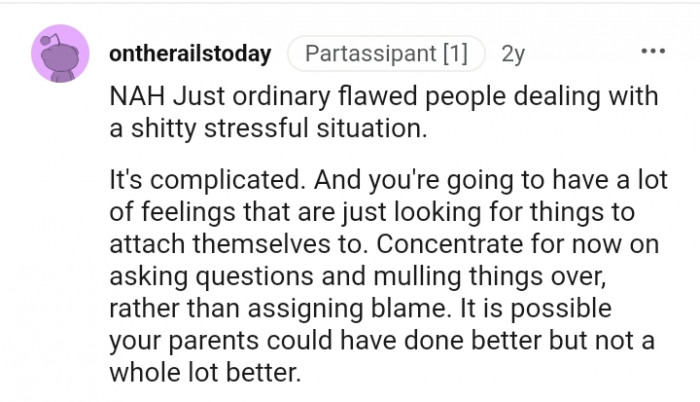
They can foot the vet bill

Coping Strategies for Grief
Developing effective coping strategies is essential for managing grief, particularly in complex situations like the loss of a pet without closure. Studies suggest that engaging in rituals, such as memorializing the pet or creating a scrapbook, can provide a sense of closure and facilitate the grieving process. According to research published in the Journal of Psychology and Health, these acts can help individuals process their emotions in a tangible way.
Additionally, support groups for pet loss can offer a community of understanding. Sharing experiences with others who have faced similar losses can create a sense of belonging and validate one's feelings, which is crucial for emotional healing.
That is not fair to you

It sounds like you love your cat very much
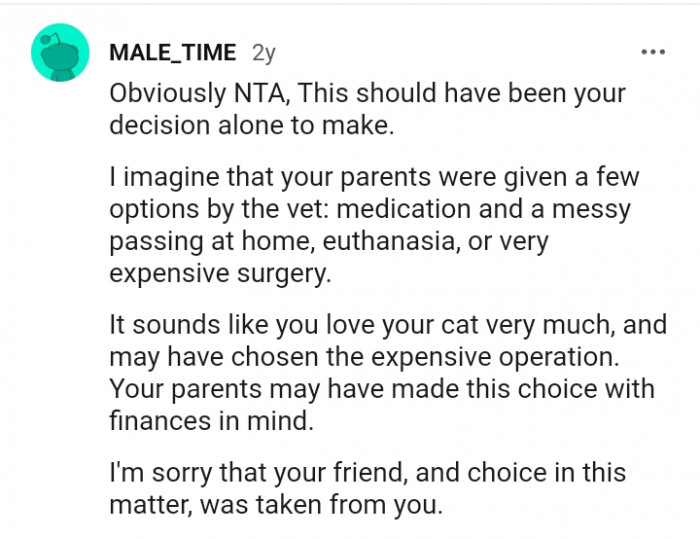
One day they'll understand how their decisions affected you
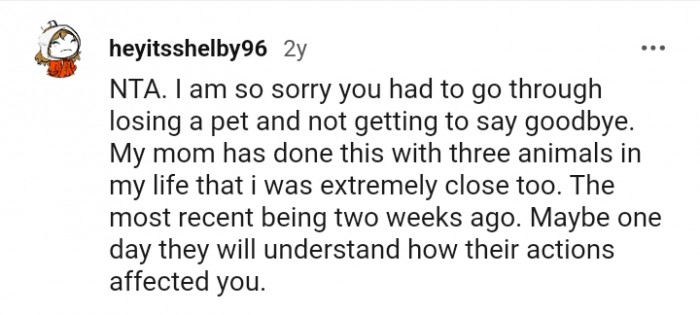
The Importance of Closure in Grieving
Psychologists highlight the significance of closure in the grieving process, which can greatly influence emotional recovery. According to Dr. Terri Orbuch, a relationship researcher and author, "Having conversations about loss and engaging in meaningful rituals can help individuals navigate their grief more effectively." Closure can manifest in various ways, such as discussing feelings surrounding the loss or participating in rituals that honor the deceased.
For the Redditor, finding avenues to create closure with their parents may be crucial for their emotional health. This could involve initiating a heartfelt conversation about their feelings or partaking in a shared remembrance of the pet, which could assist in bridging the emotional divide created by the perceived betrayal.
Cats frequently modify their typical behaviors to deal with discomfort, such as napping more than usual, rather than always yowling or sobbing. It might be challenging to understand your cat’s true emotions, so it’s crucial to consult your vet, family, and friends.
Some Redditors understood the OP’s plight, while others tried to see reasons with the parents. You can drop your thoughts in the comments below.
Psychological Analysis
This situation highlights the complexities of grief associated with pet loss and the impact it can have on relationships.
It's essential for both partners to engage in open communication about their feelings, as this can promote healing and understanding during such a difficult time.
Analysis generated by AI
Analysis & Alternative Approaches
In conclusion, navigating the grief associated with pet loss requires understanding, communication, and support.
By engaging in open discussions and creating meaningful remembrance rituals, individuals can foster healing and resilience.
Ultimately, prioritizing emotional well-being during this challenging time will strengthen relationships and create a supportive environment for both partners.
Clinical Perspective & Next Steps
Grieving the loss of a pet can be an emotionally complex process, especially when family dynamics come into play. Research from Harvard Medical School highlights the significance of recognizing and processing these feelings, as unresolved grief can lead to long-term emotional issues. Dr. Judith Herman's studies on trauma recovery emphasize the importance of creating safe spaces for expression and healing, particularly in familial settings where communication may be strained.
In such cases, exploring therapeutic avenues, whether through individual or family therapy, can be beneficial. Engaging in open discussions, developing coping strategies, and fostering emotional connections can facilitate healing and promote healthier family relationships. The journey of grief is deeply personal, but it doesn’t have to be navigated alone.



